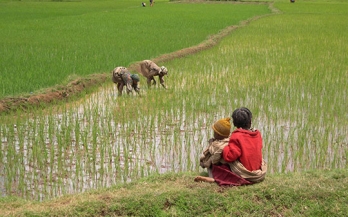This report details the event proceedings and recommendations from the Global Summit on Food Fortification. The Summit was hosted by the Tanzanian Government and GAIN in Arusha, Tanzania in September 2015. The Summit brought together parties interested in large-scale fortification: millers, the food industry, implementing agencies and governments.
This report outlines the various private sector actors involved in rice fortification, as well as the interests and role of those actors. It offers case studies which further illustrate what the critical role of the private sector has been in various delivery models.
This document highlights high-quality fortification premix (vitamins and minerals) as a necessary factor to improve the nutritious quality of food systems and achieve the intended health impact through national food fortification programs.
This snapshot report sets the perspective on food fortification and highlights the work of partners to effectively employ food fortification as part of a new global food security system. This report sets out some of the successes and lessons from GAIN's work on food fortification, as well as the partners' successes, and aspirations for the sector.
This report discusses the potential of food fortification as a viable solution to hidden hunger, malnutrition caused by the consumption of a diet that lacks essential micronutrients. Food fortification has been shown to be one of the safest and most cost-effective measures to tackle hidden hunger on a large scale.
This report highlights the successes of the global effort to eliminate iodine deficiency disorders as a public health problem. The report was commissioned as part of UNICEF-GAIN Partnership Project, funded by the Bill & Melinda Gates Foundation from 2008 to 2015, to improve iodine nutrition through salt iodisation.
This report provides an overview of the edible oil processing sector in Ethiopia. The mapping study focused on the administrative regions of Ethiopia where oil production takes place to provide prioritisation of efforts for further planning, technical assistance, monitoring, and research throughout the forthcoming edible oil fortification programme.
This report presents findings from a cross-sectional market assessment conducted by GAIN in Bangladesh that assessed the presence of edible oil brands and compared the vitamin A content of the edible oil brands with the national edible oil fortification standards.
This report presents findings from a market assessment of the presence and fortification level of vitamin A in all major brands of edible oil and vanaspati sold in Pakistan and potentially exported to Afghanistan that was undertaken to inform technical and programmatic decisions to support effective food fortification.
This report commissioned by the European Commission provides a global mapping of food fortification that is intended to serve as reference documentation. The aim of the mapping is to advance understanding on the main features of food fortification including key strategic concerns, operational challenges, compliance issues, coverage, consumption trends, as well as impact on the reduction of micronutrient deficiencies.










